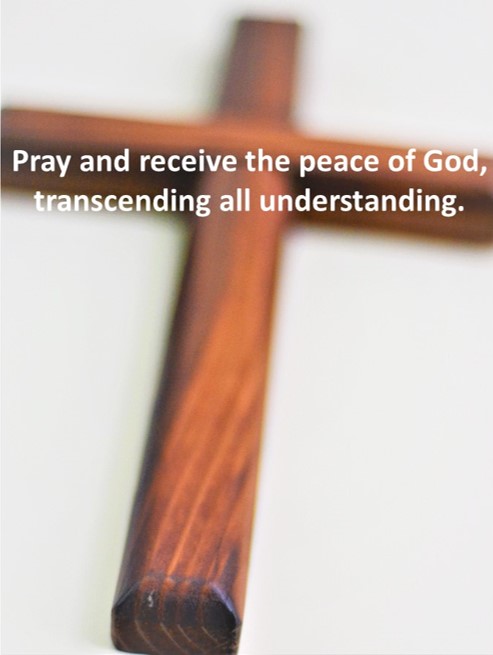Good morning!
Greetings in the name of the Father, the Son, and the Holy Spirit.
Be still, and know that I am God; I will be exalted among the nations, I will be exalted in the earth. (Psalm 46:10)

In our modern era, where technology and constant connectivity have blurred the lines between work and rest, silence and solitude have become rare treasures. Our days are often a cacophony of sounds and a flurry of activities, leaving little room for quiet reflection or moments of peace.
Amidst this relentless hustle, the gentle whisper of God’s voice can be drowned out, making it challenging for us to connect deeply with our Creator and our own inner selves. Lent, a season marked by introspection, repentance, and preparation for Easter, calls us back to the foundational spiritual disciplines of solitude and silence. These practices are not about mere physical isolation or the absence of noise but about creating sacred spaces where we can be alone with God, away from the distractions of our daily lives. It’s in these quiet moments that we can truly listen, reflect, and converse with God, allowing His presence to fill the emptiness and noise that often overwhelm us.
The tradition of seeking God in the quiet is deeply rooted in Scripture. The prophets, the psalmists, and Jesus Himself sought solitude as a means of prayer and connection with the Father. This intentional withdrawal from the noise of the world to the quiet of God’s presence is a powerful act of faith and devotion. It acknowledges our need to step away from our earthly concerns and distractions to focus on the eternal and the divine. As we journey on this Lenten journey, let us rediscover the transformative power of solitude and silence, inviting God to speak into our lives in new and profound ways.

The Biblical Foundation for Solitude and Silence
In the cacophony of our daily lives, where the constant buzz of technology and the relentless pace of modern living seldom pause, the spiritual disciplines of solitude and silence beckon us to a different rhythm—a rhythm that aligns more closely with the heartbeat of the Divine. These practices invite us into a space where the soul can breathe, listen, and respond to God in the most intimate of ways. The Biblical foundation for solitude and silence is not merely a suggestion; it is a profound invitation to experience God in the depth of our being, away from the clamor that so often saturates our existence.
Moses’ encounter with God on Mount Sinai is a striking example of solitude’s power and significance. In Exodus 34:29-35, Moses descends from Mount Sinai after spending forty days and nights alone with God, without eating bread or drinking water. During this time, he received the Ten Commandments, laws that would define the covenant between God and His people. This profound encounter in solitude not only transformed Moses internally but was also externally visible through his radiant face, a testament to the transformative power of God’s presence.
Similarly, the prophet Elijah’s experience on Mount Horeb (1 Kings 19:11-13) underscores the value of silence. After a powerful display of God’s might through wind, earthquake, and fire, Elijah finds God not in the tumult but in a “still small voice” or a “gentle whisper.” This moment reveals that God’s communication with us is not always through grandiose events but often in quiet, subtle whispers that require us to be in a state of attentive silence to perceive and understand.
The life of Jesus Christ Himself is replete with instances of seeking solitude for prayer and communion with the Father. Before embarking on His public ministry, Jesus spent forty days and nights in the wilderness, fasting and praying (Matthew 4:1-11). This period of solitude was crucial for His preparation and spiritual fortification against the temptations that would come. Moreover, Jesus regularly withdrew from the crowds and even His disciples to pray in solitude, as seen in Luke 5:16, “But Jesus often withdrew to lonely places and prayed.” These moments of solitude were not incidental; they were integral to His ministry, teaching, and the sustaining of His relationship with the Father.
In embracing solitude and silence, we follow a path well-trodden by the faithful throughout history—a path that leads us closer to the heart of God. Psalm 46:10 eloquently captures the essence of this practice: “Be still, and know that I am God.” This verse is not merely an invitation to physical stillness but to a spiritual quietude that acknowledges God’s sovereignty and presence in our lives. In the stillness, we are reminded of our dependence on God, our need for His guidance, and the peace that comes from surrendering our lives to His will.
The Biblical foundation for solitude and silence is both a heritage and a challenge—a heritage that connects us with the great cloud of witnesses who have gone before us and a challenge to carve out sacred spaces in our lives for God. In these spaces, we are prepared for significant encounters with the Divine, stripped of the distractions that cloud our spiritual vision, enabling us to focus solely on God’s presence and voice. As we venture into the quiet, may we find the courage to listen, the grace to hear, and the faith to respond to the gentle whispers of God that guide, comfort, and transform us.

The Transformative Power of Solitude and Silence
The transformative power of solitude and silence stretches beyond the mere absence of sound and company; it offers a profound spiritual arena where the soul encounters God in its rawest form. This deep engagement fosters an environment ripe for personal growth and spiritual renewal, as it compels us to face the depths of our being in God’s presence. The Biblical narrative is replete with instances that underscore the value of these practices, revealing their role in spiritual transformation and intimacy with God.
David, the shepherd king, poignantly expressed the soul’s yearning for God in solitude in Psalm 42:1-2, “As the deer pants for streams of water, so my soul pants for you, my God. My soul thirsts for God, for the living God. When can I go and meet with God?” David’s solitude was not just physical but a state of spiritual longing and pursuit of God’s presence, illustrating how solitude and silence orient the heart towards divine thirst and satisfaction.
In the New Testament, the Apostle Paul speaks to the transformation that occurs through the renewal of the mind in Romans 12:2, “Do not conform to the pattern of this world, but be transformed by the renewing of your mind. Then you will be able to test and approve what God’s will is—his good, pleasing and perfect will.” Solitude and silence are the fertile ground where this renewal process thrives, away from the world’s clamor, enabling believers to discern and embrace God’s will.
The practice of solitude and silence allows for an introspective journey, confronting and refining our inner thoughts, fears, and desires. Lamentations 3:28-29 says, “Let him sit alone in silence, for the Lord has laid it on him. Let him bury his face in the dust—there may yet be hope.” This suggests a posture of humility and submission where, in silence, we acknowledge our vulnerabilities and rely on God’s mercy and hope.
Moreover, solitude and silence are not only about self-reflection but also about transformation through engagement with Scripture. Psalm 119:15 declares, “I meditate on your precepts and consider your ways.” In the quiet, the Word of God penetrates deeply, transforming our hearts and minds as we meditate on His truths, aligning our desires and actions with His.
The solitude of Jesus, particularly before crucial moments of His ministry, showcases the indispensable role of quiet communion with the Father. Mark 1:35 captures this, “Very early in the morning, while it was still dark, Jesus got up, left the house and went off to a solitary place, where he prayed.” Jesus’ example illuminates the strength, guidance, and clarity derived from these moments of solitude, equipping Him for the demands of His mission. For believers, this underscores the importance of seeking solitary time with God to foster spiritual strength and direction.
The practice of solitude and silence is transformative, cultivating a deeper sense of self-awareness and a profound reliance on God. It is in the quiet that we are stripped of pretenses and distractions, enabling a genuine encounter with God. This encounter is not passive but actively shapes our character, desires, and actions in alignment with God’s will, leading to a life marked by spiritual vitality and purpose.
As we engage in solitude and silence, we embark on a journey of personal and spiritual renewal, echoing the Psalmist’s declaration in Psalm 51:10, “Create in me a pure heart, O God, and renew a steadfast spirit within me.” This journey is not without its challenges, requiring intentionality and discipline. Yet, the rewards are immeasurable, offering a deeper connection with God, transformation into His likeness, and an anchored soul in the tumult of life.
Practical Ways to Incorporate Solitude and Silence into Daily Life
Incorporating solitude and silence into our daily lives is a practice deeply rooted in intentionality and the deliberate pursuit of God’s presence. While the bustling nature of our routines may seem to leave little room for quiet reflection, Scripture offers wisdom on the importance of creating spaces for solitude and silence, emphasizing their role in our spiritual growth and connection with God.
- Begin the Day with God
Starting the day in prayer and silence sets a tone of dependence on God for the hours ahead. Mark 1:35 exemplifies this, showing Jesus Himself rising early to find solitude for prayer: “Very early in the morning, while it was still dark, Jesus got up, left the house and went off to a solitary place, where he prayed.” By emulating Jesus’ example, we can cultivate a habit of seeking God’s guidance and strength before the day’s demands encroach upon our peace.
- Short Pauses for Reflection and Prayer
The Psalms frequently extol the virtues of meditating on God’s laws and precepts throughout the day. Psalm 119:97 says, “Oh, how I love your law! I meditate on it all day long.” Implementing short breaks for reflection and prayer can act as spiritual refreshments that refocus our minds on God’s sovereignty and care amidst daily tasks.
- Dedicate Time for Silent Reflection
Setting aside specific times for silent reflection is essential for deeper spiritual encounters. Acts 17:11 praises the Bereans for their diligent engagement with Scripture, highlighting the value of dedicated study and reflection: “Now the Berean Jews were of more noble character than those in Thessalonica, for they received the message with great eagerness and examined the Scriptures every day to see if what Paul said was true.” While this verse emphasizes the study of Scripture, the principle of setting aside time for focused engagement with God’s Word can be extended to include periods of silent reflection.
- Use Nature as a Sanctuary
The beauty and tranquility of nature often provide a perfect backdrop for solitude and silence. Jesus’ withdrawal to a mountainside or a solitary place in nature, as mentioned in Matthew 14:23, underscores the restorative power of being alone in God’s creation. “After he had dismissed them, he went up on a mountainside by himself to pray.” Finding a quiet spot in nature can help detach us from the distractions of technology and the busyness of life, offering a serene environment for prayer and meditation.
- Embrace Solitude in Community
Solitude and silence do not always mean isolation. Participating in corporate silent retreats or dedicated times of silent worship within a faith community can enrich our practice of these disciplines. As in Matthew 18:20, where Jesus says, “For where two or three gather in my name, there am I with them,” there is a profound presence of God experienced in the collective silence and prayerful solitude among believers.
- Journaling as a Silent Practice
Journaling can be a form of silent prayer and reflection, offering a way to articulate thoughts, prayers, and reflections before God. Psalm 143:5 illustrates the reflective recollection of God’s deeds: “I remember the days of long ago; I meditate on all your works and consider what your hands have done.” Writing can help process feelings, discern God’s voice, and document spiritual growth over time.
Embracing solitude and silence requires a conscious effort to slow down and make space for God in our daily routines. It’s about finding balance and recognizing the need for quiet in the midst of life’s noise. Through intentional practice, believers can discover the depth of God’s presence in the quiet, transforming their spiritual lives and deepening their connection with the Divine.
Summary and Life Application:
In embracing the practices of solitude and silence, we are invited to slow down and listen attentively to God’s voice. These disciplines offer us a path to deeper spiritual clarity, peace, and understanding, enriching our relationship with God and empowering us to live more purposefully and compassionately.
As we continue our Lenten journey, let us commit to finding moments for solitude and silence, allowing God to work within our hearts. May we discover the transformative power of these practices, not just during Lent, but as a regular part of our spiritual lives. In doing so, we open ourselves to the profound peace and wisdom that comes from God alone, which sustains us in our journey through life and draws us ever closer to Him.
Life Application Challenge
– This week, I challenge you to identify one or two specific times each day for solitude and silence. Begin with just five minutes, and gradually increase the time as you feel comfortable.
– Keep a journal of your experiences, noting any insights, challenges, or changes you observe in your relationship with God and yourself.
– Share your journey with a trusted friend or small group, encouraging one another as you explore these practices together.

And the peace of God, which transcends all understanding, will guard your hearts and your minds in Christ Jesus. (Philippians 4:7)
